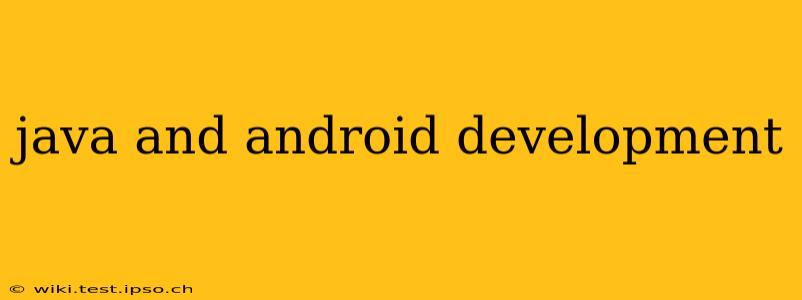Java and Android development are intrinsically linked. Android, Google's mobile operating system, uses Java (and now Kotlin) as its primary programming language. This means that a strong understanding of Java is crucial for anyone looking to build Android apps. This guide delves into the relationship between Java and Android development, exploring key concepts and addressing common questions.
What is Java, and Why is it Important for Android Development?
Java is a robust, object-oriented programming language known for its platform independence ("write once, run anywhere"). This means code written for one system can, in principle, run on any other system with a Java Virtual Machine (JVM). While Android now officially supports Kotlin as a first-class language, Java remains a significant part of the Android ecosystem, and a large portion of existing Android codebases are written in Java. Understanding Java's core principles—like object-oriented programming (OOP), exception handling, and concurrency—is essential for writing efficient and maintainable Android applications.
What are the Key Differences Between Java and Android Development?
While Java is the foundation, Android development involves much more than just Java programming. Android development introduces specific frameworks, tools, and concepts that are unique to the Android platform. These include:
- Android SDK (Software Development Kit): This provides the necessary tools, libraries, and APIs to build Android apps. It includes things like UI components, networking capabilities, and access to device hardware.
- Android Studio: The official IDE (Integrated Development Environment) for Android development. It simplifies the development process with features like code completion, debugging tools, and an emulator for testing apps.
- XML for Layouts: Android uses XML to define the user interface (UI) of an app. This separates the UI from the app's logic, making it easier to maintain and modify.
- Activities and Fragments: These are fundamental building blocks of Android apps, representing different screens and parts of the screen.
- Intents: These are messaging objects used for communication between different components of an Android app or even between different apps.
How Do I Get Started with Java and Android Development?
Getting started requires a multi-step approach:
- Learn Java: Start by mastering the fundamentals of Java programming, including OOP concepts, data structures, and algorithms. Numerous online resources and tutorials are available.
- Install Android Studio: Download and install the latest version of Android Studio, which includes everything you need to build Android apps.
- Familiarize Yourself with the Android SDK: Explore the different components and libraries provided by the Android SDK.
- Follow Tutorials: Many online tutorials and courses guide you through building simple Android apps, allowing you to gradually build your skills.
- Practice Consistently: The key to becoming proficient is consistent practice. Start with small projects and progressively tackle more complex challenges.
What are Some Popular Android Development Frameworks?
Beyond the core Android SDK, several frameworks streamline specific aspects of Android development:
- Jetpack Compose: A modern, declarative UI toolkit that simplifies UI development.
- Retrofit: A popular library for making network requests.
- Room: A persistence library providing an abstraction layer over SQLite.
Is Java Still Relevant for Android Development in 2024?
While Kotlin has gained popularity, Java remains a significant language in the Android ecosystem. Many existing apps are written in Java, and developers often choose Java based on their existing skills and experience. The choice between Java and Kotlin often depends on project requirements and developer preferences. Both languages are fully supported by Android Studio.
What are the Future Trends in Java and Android Development?
Future trends include:
- Increased adoption of Kotlin: While Java remains relevant, Kotlin's concise syntax and enhanced features are attracting more developers.
- Focus on declarative UI: Frameworks like Jetpack Compose promote a more declarative and streamlined UI development approach.
- Growing importance of cross-platform development: Tools and frameworks that allow building apps for multiple platforms (Android, iOS, web) with a single codebase are becoming increasingly important.
This comprehensive guide provides a solid foundation for understanding the relationship between Java and Android development. Remember that continuous learning and practice are key to success in this dynamic field. The Android developer community is vast and supportive, offering ample resources to aid your journey.
